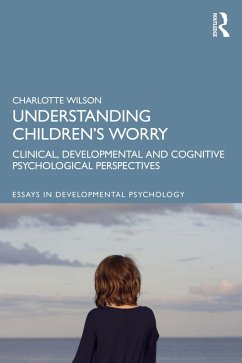
No Words for Feelings (eBook, ePUB)
Alexithymia as a Fundamental Personality Dimension at the Interface of Cognition
Redaktion: Luminet, Olivier; Ridout, Nathan; Nielson, Kristy
Versandkostenfrei!
Sofort per Download lieferbar
52,95 €
inkl. MwSt.
Weitere Ausgaben:

PAYBACK Punkte
26 °P sammeln!
Alexithymia is a multifaceted construct that is characterized by several facets, including difficulties identifying one's feelings; difficulties describing one's feelings to others; and an externally focused, utilitarian cognitive style. In the long-term, higher alexithymia scores represent risks factors for poorer mental and physical health outcomes. There is, however, a lack of systematic understanding of the underlying processes that can explain these vulnerabilities.This book shows that the facets of alexithymia influence several aspects of how one perceives and responds to neutral and emo...
Alexithymia is a multifaceted construct that is characterized by several facets, including difficulties identifying one's feelings; difficulties describing one's feelings to others; and an externally focused, utilitarian cognitive style. In the long-term, higher alexithymia scores represent risks factors for poorer mental and physical health outcomes. There is, however, a lack of systematic understanding of the underlying processes that can explain these vulnerabilities.
This book shows that the facets of alexithymia influence several aspects of how one perceives and responds to neutral and emotional situations, by impacting multiple cognitive processes (attention, appraisals, memory, language and behavior). The effects are influenced by context, with some situations leading to deficits in emotion responding, and others that contribute to emotional over-responding. The book shows the importance of drawing better connections amongst multiple processes, toward disentangling them and revealing where early processes have impacts on later processes. A lack of correspondence between processes, as well as amongst alexithymia facets is expected to lead to ineffective and inflexible emotion regulation, thereby posing elevated risks for physical and mental illness.
The chapters in this book were originally published as a special issue of Cognition and Emotion.
This book shows that the facets of alexithymia influence several aspects of how one perceives and responds to neutral and emotional situations, by impacting multiple cognitive processes (attention, appraisals, memory, language and behavior). The effects are influenced by context, with some situations leading to deficits in emotion responding, and others that contribute to emotional over-responding. The book shows the importance of drawing better connections amongst multiple processes, toward disentangling them and revealing where early processes have impacts on later processes. A lack of correspondence between processes, as well as amongst alexithymia facets is expected to lead to ineffective and inflexible emotion regulation, thereby posing elevated risks for physical and mental illness.
The chapters in this book were originally published as a special issue of Cognition and Emotion.
Dieser Download kann aus rechtlichen Gründen nur mit Rechnungsadresse in A, B, BG, CY, CZ, D, DK, EW, E, FIN, F, GR, HR, H, IRL, I, LT, L, LR, M, NL, PL, P, R, S, SLO, SK ausgeliefert werden.













